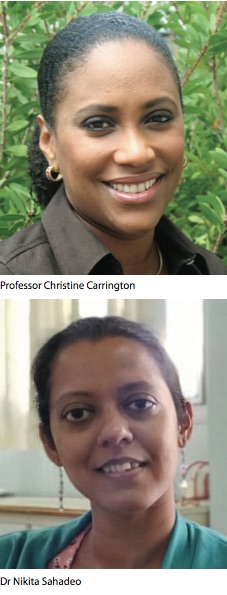
A team of researchers from The UWI St Augustine has embarked on a project to analyse coronavirus genomes from infected individuals. The exercise will enhance Trinidad and Tobago’s capacity to identify different lineages of the virus and monitor mutations in order to track the virus’ spread, distinguish between local and newly imported cases, and to better understand the virus and our immune system’s response to it.
“The important thing,” says project lead Christine Carrington, Professor of Molecular Genetics and Virology at The UWI St Augustine’s Faculty of Medical Sciences, “is that whole genome sequencing of the virus can provide epidemiological insights that can inform public health responses. The Nanopore sequencing technology we are using is very rapid. The data is available in real-time, so the insights gained are actionable.”
Titled “COVID-19: Infectious Disease Molecular Epidemiology for Pathogen Control and Tracking (COVID-19: IMPACT)”, the project involves extracting and sequencing genomes of severe acute respiratory syndrome coronavirus 2 (SARS-COV-2) from patient samples. Genomes are the “hereditary blueprint” of all living organisms, including viruses, written on a strand of ribonucleic acid (RNA) in so-called RNA viruses like SARS-COV-2. RNA viruses frequently undergo mutation and, by tracking these changes, scientists are able to gather important data about diseases and their spread.
The data, Professor Carrington says, has many uses: “You can use it to determine whether a group of cases are linked to each other. For example, if you detect a number of cases in a workplace, you can address questions such as, ‘Are these infections related to each other? Has there been spread within the workplace? Or did each of the affected individuals acquire the infection independently, outside the workplace?’”

This project, which is funded by a grant from the UWI-Trinidad and Tobago Research, Development and Impact (RDI) Fund, can make an important contribution to the national COVID-19 response as Trinidad and Tobago seeks to balance public health with the need to boost economic activity. The research team includes investigators from UWI, Trinidad and Tobago’s Ministry of Health, the Caribbean Public Health Agency (CARPHA), the University of Oxford, and the University of London.
Professor Carrington says the data will also be very useful when Trinidad and Tobago has access to a COVID-19 vaccine: “We will need to assess the impact of the vaccine. These molecular approaches can be used to monitor levels of viral diversity in the country and to estimate changes in viral population size.”
COVID-19: IMPACT is still in its early phase. Dr. Nikita Sahadeo, postdoctoral researcher on the project, has just generated the first five SARS-COV-2 genomes from Trinidad and Tobago. The project will expand, Carrington says, “to get baseline data on the coronavirus lineages that have circulated in Trinidad and Tobago, the level of diversity we have, and how it has changed over time”. The project team will also analyse what is happening across the rest of the Caribbean with CARPHA facilitating this. “There are now hundreds of thousands of SARS-COV-2 genomes publicly available, but the vast majority is from the UK, and the Caribbean region is very under-represented.”
“Once we have that data,” says Professor Carrington, “we will be in a position to better answer questions that public health bodies might have. The aim with the establishment of this local capacity for rapid whole genome sequencing is to be able to respond to the public health bodies, not just with COVID-19 but also other infectious diseases in the future.”